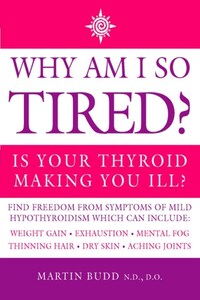Why am I so Tired?
Is Your Thyroid Making you Ill?
MARTIN BUDD N.D., D.O.
This book could not have been written without the enthusiastic support of my wife, Maggie.
Low Blood Sugar
Diets to Help Diabetes Diets to Help Migraine Recipes for Health: Low Blood Sugar (with Maggie Budd) Why Can't I Lose Weight Eat to Beat – Low Blood Sugar
While the author of this work has made every effort to ensure that the information contained in this book is as accurate and up to date as possible at the time of publication, medical and pharmaceutical knowledge is constantly changing and the application of it to particular circumstances depends on many factors. Therefore it is recommended that readers always consult a qualified health specialist for individual advice. This book should not be used as an alternative to seeking specialist advice, which should be sought before any action is taken. The authors and publishers cannot be held responsible for any errors and omissions that may be found in the text, or any actions that may be taken by a reader as a result of any reliance on the information contained in the text, which is taken entirely at the reader’s own risk.
My interest in low grade or mild hypothyroidism began in the early 1980s. Following the publication of my first book Low Blood Sugar (hypoglycaemia) in 1981, I was consulted by many exhausted, depressed patients who having read the book were convinced that they had discovered the mystery cause behind their symptoms. However, it soon became apparent to me as I became more familiar with the diagnosis of hypoglycaemia, that approximately one third of the patients did not suffer from low blood sugar, but their fatigue was caused by another illness — undiagnosed mild hypothyroidism.
Hypothyroidism is often missed in patients suffering from fatigue because many of these people do not fit into the medical definition of ‘hypothyroid’; many hypothyroid patients show clear test results under the accepted medical blood tests or do not fit into the typical picture of an overweight, middle-aged hypothyroid sufferer. For example, many young hypothyroid patients are not overweight but underweight. Men and women of all ages can develop thyroid problems, and there are over 100 symptoms caused by thyroid deficiency. The overweight middle-aged female with exhaustion and alopecia may well be the archetypal patient but a ‘typical’ thyroid syndrome does not exist. Each patient can present their own unique symptom picture. Every organ and system in the body can be disturbed when the thyroid is underactive, and a mild thyroid malfunction can give rise to 10-20 different symptoms in each patient. Symptoms as diverse as leg cramps, allergic rhinitis, constipation, period pains and poor memory have all been attributed to hypothyroidism.
Mild or early stage health problems often go undiagnosed as laboratory tests identify only major blood changes. This has led to a situation where many suffer symptoms of illness — but not ‘clinically’ bad enough for a blood test diagnosis to be made.
Blood tests are only a reliable guide to diagnosis when the procedures for testing and the interpretation of the results are standardized. For example, with the diagnosis of diabetes, the test procedures and the normal ranges for blood glucose are internationally recognized. The test results therefore provide a reliable guide to the diagnosis, the severity and the successful treatment of diabetes. Unfortunately, the same cannot be said when testing for thyroid disorders.
In Why am I so Tired? I discuss many of the symptoms, treatments and causes of this underdiagnosed health condition. In Part One I describe how the thyroid influences the body and explain in detail the most common symptoms of untreated hypothyroidism. In Part Two I compare and elucidate the different diagnostic methods and show you some simple diagnostic tests you can carry out easily at home. I discuss both medical and naturopathic treatment and illustrate how diet, exercise and lifestyle changes, can go a long way to relieving your symptoms. Lastly, I discuss many of the underlying causes of a thyroid disorder so you can not only treat your symptoms more effectively, but learn to understand how your body became fatigued. I also discuss some of the different causes and diagnostic techniques for fatigue itself, so that you may begin to treat fatigue even if you feel hypothyroidism may not be the underlying illness.










